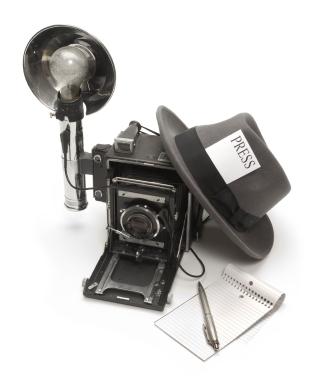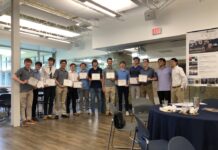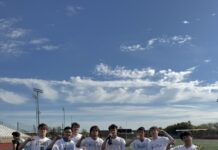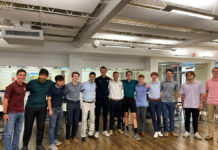This summer, at the urging of The Roundup moderators Dr. Michael Degen, Sheryl Row, and Fritz Asche, writer Payton Maher, ’13, and editor-in-chief Clark Durham, ’12, participated in writing camps this June. Maher took place in The Dallas Morning News’ yearly high school journalism camp, while Durham traveled to Austin for the University Interscholastic League’s summer writing workshop on the University of Texas campus. Below are narratives by Durham and Maher on their experiences at their respective camps.
Maher Rubs Elbows with Dallas’ Best at DMN Camp
The Dallas Morning News Summer Workshop, held from June 13 to July 1, 2011, allowed sophomore students to experience firsthand the skills writing for a major newspaper takes. The first few days, our group of around twenty sophomore students from around Dallas, led by organizer Linda Leavell of the DMN and instructor Rich James of Duncanville High School, toured a part of the DMN complex, met DMN writers and editors, and even listened to an optimistic morning budget meeting (the day after the Mavs won the championship).
On the fifth day of the workshop, sports columnist Jean-Jacques Taylor spoke to us about editorial writing and shared his unique writing style, hoping to inspire us to use our own creative techniques. Over the course of the eight out of fifteen days I attended the workshop, we wrote two articles, one being a review that Entertainment editor Dawn Burkes gave us advice about.
The most memorable event of the workshop for me, however, was my final day, when Derek Holland, pitcher for the Texas Rangers, came and talked with us about the life story. Akshay Mirchandani, an Allen High School student, commented on his experience at the workshop: “Talking to all of the writers was really awesome because I got pointers from people in business about how to improve my writing and interviewing techniques,” said Mirchandani. “The press conference with Derek Holland was also a really cool thing for me because I want to be a sports writer, so it was great getting to interview him.”
With new writing skills learned from the DMN Summer Workshop, I, among the other attendees, will enthusiastically apply those abilities toward future articles for The Roundup.
Durham Travels to Burnt Orange Territory for Writing Workshop
Every year, the University Interscholastic League (UIL) sponsors a student publications workshop at the University of Texas campus in Austin. This year’s program ran from June 24-27 and hosted a record-setting 420 young writers from across the state. In the spring, the moderators of high school newspapers in hundreds of Texas cities and towns were asked to nominate students to participate in the workshop. Jesuit’s newspaper moderators, Dr. Michael Degen, Sheryl Row, and Fritz Asche, prudently nominated then-managing editor and current Editor-in-Chief Clark Durham, ’12, for the program.
The workshop began with a lengthy check-in that allowed students to settle into their Jester Dormitory rooms before wandering down grooving Guadalupe Street. Despite the Longhorns’ laughably dismal campaign last football season, the street was already abuzz with UT football fever. After check-in, students proceeded with their classmates to an opening assembly highlighted by an energetic and decidedly esoteric speech by the program’s director, Miss Jeanne Acton. Students were then dismissed to find their afternoon classes in the labyrinthal University Teaching Center (UTC) and become acquainted with their group leader for the week.
The distinctive advantage of the UIL’s workshop over other state writing programs is its diverse and comprehensive class options. When moderators recommended students for the program in the spring, they signed up their participants in individual classes that ranged from yearbook design to editorial theme development. I was enrolled in the newspaper editorial leadership course, a class for editors in chief that highlighted the conceptual and day-to-day aspects of running a paper. The small, personalized class was led by award-winning publisher Jeff Nardone and began with editors expressing their top concerns about their respective publications.
On Friday, the first day of classes, the editorial leadership class focused on the common traits of journalists and the purpose of an editorial staff. Mr. Nardone then briefly described the basics of running a newspaper and managing a staff of writers. After dinner in the Jester West cafeteria, students returned to the UTC for a laid-back evening class. In the editors’ class, the group brainstormed controversial editorial ideas that ranged from doing away with lockers to legalizing drugs on high school campuses. This exercise brought the normally timid group of kids out of their shells, as editors pondered their perfect (if unrealistic) opinion piece.
Classes picked up again early the next day, as weary-eyed students descended upon the UTC for a busy day of classes. In the morning, Mr. Nardone instructed the editors on how to manage their writers and make sure everyone in the program is included. In describing how to recruit new writers, Mr. Nardone uttered the most memorable quote of the camp: “You want a good mix of [jerks] working for your paper. They bring new, provocative perspectives to your publication and make it interesting to read.” The class then continued to discuss leadership tricks before an early lunch.
After lunch, students program-wide were invited to participate in the cornerstone event of the workshop: a mock press conference with Carlton Huntley, head of the University of Texas chapter of the Gay-Straight Alliance (GSA). Adorned with reporter notebooks, cameras, and press passes, young journalists descended upon the UTC’s lecture hall to meet Huntley. Huntley delivered a moving speech that touched on his experiences as a sexually confused child, his encounters with bullying, and, ultimately, his decision to come out as gay. The floor was then opened to questions from the students, who grilled the young speaker on solutions to the bullying problem and on the steps needed to make school a more enjoyable experience for the Lesbian-Gay-Bisexual-Transgender (LGBT) community.
For the rest of that day’s editorial leadership class, students worked on writing a rough draft editorial for their papers’ first editions. Mr. Nardone first explained the purpose of an editorial, to inform readers on “what they should know but don’t know,” before working individually with students to craft their editorials. Students spent the rest of the day crafting their editorials, and in most cases, cutting verbosity out of their writing.
On Sunday, the final day of the workshop, students in the editorial leadership class crafted special feature sections for their paper. Special feature sections are a group of pages in a newspaper devoted to one school subject, such as new campus renovations or the school’s foreign exchange program. Editors not only brainstormed content for the section, but also designed powerful front pages for the feature that included artwork, graphs, and fact boxes.
Editors spent their final class of the workshop presenting their editorials and taking part in a wrap-up awards ceremony, where Jesuit’s Clark Durham, ’12, won the top editorial writer award for his piece on Jesuit’s heavy course requirements for graduation. Finally, students checked out of their Jester dorms and ventured back to their respective homes, ready to apply their new skills to their student newspapers.






